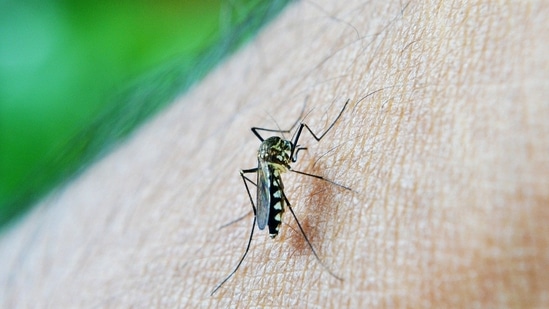
Dengue in children: Doctor shares warning signs for parents to watch out
null | 0 Views
The occasional showers in the summer season make the perfect breeding situation for mosquitoes, giving way to mosquito-borne infections. Malaria and dengue are rampant during the summer season, and it is important to take the necessary precautions to stay safe. Also read | Beat the bite: Essential dengue precautions you must follow as cases rise in India
In children, dengue can take fatal shape in very less days. For children, it is necessary to detect the early signs and symptoms of the disease and take the steps to keep them safe. In an interview with HT Lifestyle, Dr Anurag Aggarwal, Consultant - Internal Medicine at Fortis Escorts Hospital in Faridabad, said, “Spread by the Aedes aegypti mosquito, dengue can advance fast in young patients if not caught early. Early detection of signs by parents can be life-saving.”
Here are the warning signs of dengue in children:
- Sudden high fever (up to 104°F or 40°C)
- Severe headache, frequently behind the eyes
- Painful muscles and joints, sometimes referred to as "breakbone fever"
- Nausea and vomiting
- Fatigue and crankiness
- Rash on the skin appearing 2–5 days after fever starts

“In some children, severe dengue, or dengue hemorrhagic fever, develops. This type can cause shock, internal bleeding, and damage to organs. Parents should immediately consult a doctor if any of these symptoms occur,” added Dr Anurag Aggarwal. He further added the symptoms that can denote fatality of the disease. Also read | Rising temperatures, longer monsoons make dengue constant danger in South Asia; tips to address this evolving threat
- Recurrent vomiting
- Severe stomach pain
- Bleeding nose or gums
- Nosebleed or bleeding gums
- Vomiting blood or black, tarry stools
- Restlessness or drowsiness
- Cold or clammy extremities
- Difficulty or rapid breathing
What parents should do:
“If dengue is suspected, make the child well-hydrated and immediately contact a pediatrician. Avoid aspirin and ibuprofen, which exacerbate bleeding. Paracetamol (acetaminophen) is commonly advised to alleviate fever and pain. Prompt medical attention, observation, and supportive management can effectively minimize the chance of complications. Sensitivity and timely action are essential in guaranteeing the safety and recovery of the child,” added the doctor. Also read | Dengue: How it can affect your brain and the nervous system
Note to readers: This article is for informational purposes only and not a substitute for professional medical advice. Always seek the advice of your doctor with any questions about a medical condition.
Read more news like this on HindustanTimes.com









